|
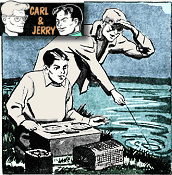 Carl and Jerry stories are usually a good
mixture of teenage curiosity, adventure, and electronics technology, but this "Out
of the Depths" episode is a bit too far-fetched. The first ninety percent of
this 1957 Popular Electronics magazine tale fulfills expectations, with
the boys applying their shared interest in technology while attempting to learn
and apply the technique of luring elusive fish from their safe dwelling places and
onto the ends of their hooks. A car battery, DC-to-AC inverter, tape recorder, and
high-gain microphone are the basis for the scheme. Things were going well, and I
expected the normal hard-fought victory with big, fat bass in their creels - and
then something only slightly more believable than finding a crashed alien spaceship... Carl and Jerry stories are usually a good
mixture of teenage curiosity, adventure, and electronics technology, but this "Out
of the Depths" episode is a bit too far-fetched. The first ninety percent of
this 1957 Popular Electronics magazine tale fulfills expectations, with
the boys applying their shared interest in technology while attempting to learn
and apply the technique of luring elusive fish from their safe dwelling places and
onto the ends of their hooks. A car battery, DC-to-AC inverter, tape recorder, and
high-gain microphone are the basis for the scheme. Things were going well, and I
expected the normal hard-fought victory with big, fat bass in their creels - and
then something only slightly more believable than finding a crashed alien spaceship...
 RCA, the
Radio Corporation of America was not merely a manufacturer of
radio, television, and phonograph equipment for home entertainment. The company
also made vacuum tubes for all sots of electronic equipment, and produced a weekly
radio broadcast called "Magic Key" on the NBC Blue Network. Sticking to their communications
roots, RCA today markets televisions, microwave ovens, Android-based tablet computers,
DVD / Blu Ray drives, telephones, 2-way radios, radios, clocks, antennas, and many
other devices - with no tubes in sight, not even in their TV displays... RCA, the
Radio Corporation of America was not merely a manufacturer of
radio, television, and phonograph equipment for home entertainment. The company
also made vacuum tubes for all sots of electronic equipment, and produced a weekly
radio broadcast called "Magic Key" on the NBC Blue Network. Sticking to their communications
roots, RCA today markets televisions, microwave ovens, Android-based tablet computers,
DVD / Blu Ray drives, telephones, 2-way radios, radios, clocks, antennas, and many
other devices - with no tubes in sight, not even in their TV displays...
 "Scientists at the University of New Hampshire
are using artificial intelligence to dramatically speed up the search for
new magnetic materials. Their approach has produced a searchable database containing
67,573 magnetic materials, including 25 previously unknown compounds that retain
their magnetism at high temperatures, a key requirement for many real-world applications.
'By accelerating the discovery of sustainable magnetic materials, we can reduce
dependence on rare earth elements, lower the cost of electric vehicles and renewable
energy systems, and strengthen the U.S. manufacturing base,' said Suman Itani, lead
author of the study..." "Scientists at the University of New Hampshire
are using artificial intelligence to dramatically speed up the search for
new magnetic materials. Their approach has produced a searchable database containing
67,573 magnetic materials, including 25 previously unknown compounds that retain
their magnetism at high temperatures, a key requirement for many real-world applications.
'By accelerating the discovery of sustainable magnetic materials, we can reduce
dependence on rare earth elements, lower the cost of electric vehicles and renewable
energy systems, and strengthen the U.S. manufacturing base,' said Suman Itani, lead
author of the study..."
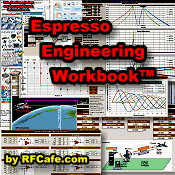 Breaking News!
Espresso
Engineering Workbook™ v3.2.2026 has just been released. This makes the 49th
worksheet added. It calculates magnitude, phase, and group delay for Butterworth
and Chebyshev lowpass, highpass, bandpass, and bandstop filters. Outside of the
kilobuck simulators, finding a calculator for phase and group delay is extremely
difficult - believe me, I've searched extensively for years. Espresso Engineering
Workbook™ can be downloaded free of charge. All you need is Excel™ v2007 or newer.
It is provided compliments of my advertisers. Contact me if you would like your
company added to the next release. Breaking News!
Espresso
Engineering Workbook™ v3.2.2026 has just been released. This makes the 49th
worksheet added. It calculates magnitude, phase, and group delay for Butterworth
and Chebyshev lowpass, highpass, bandpass, and bandstop filters. Outside of the
kilobuck simulators, finding a calculator for phase and group delay is extremely
difficult - believe me, I've searched extensively for years. Espresso Engineering
Workbook™ can be downloaded free of charge. All you need is Excel™ v2007 or newer.
It is provided compliments of my advertisers. Contact me if you would like your
company added to the next release.
 Disneyland opened its gates in Anaheim,
California on July 17, 1955. It was billed as the most high-tech theme park in the
world, with a "wow" factor on par with the World's Fair extravaganzas. One of its
much-ballyhooed features was the "realistic" jungle safari tour with life-like animal
automatons and authentic 3-D jungle sounds. This article, published less than a
year after opening day, highlights some of the equipment and methods used by artists
and engineers to achieve the effects... Disneyland opened its gates in Anaheim,
California on July 17, 1955. It was billed as the most high-tech theme park in the
world, with a "wow" factor on par with the World's Fair extravaganzas. One of its
much-ballyhooed features was the "realistic" jungle safari tour with life-like animal
automatons and authentic 3-D jungle sounds. This article, published less than a
year after opening day, highlights some of the equipment and methods used by artists
and engineers to achieve the effects...
 Established in 1990,
dB Control supplies mission-critical,
often sole-source, products worldwide to military organizations, as well as to major
defense contractors and commercial manufacturers. dB Control designs and manufactures
high-power TWT amplifiers, microwave power modules, transmitters, high- and low-voltage
power supplies, and modulators for radar, ECM, and data link applications. Modularity
enables rapid configuration of custom products for a variety of platforms, including
ground-based and high-altitude military manned and unmanned aircraft... Established in 1990,
dB Control supplies mission-critical,
often sole-source, products worldwide to military organizations, as well as to major
defense contractors and commercial manufacturers. dB Control designs and manufactures
high-power TWT amplifiers, microwave power modules, transmitters, high- and low-voltage
power supplies, and modulators for radar, ECM, and data link applications. Modularity
enables rapid configuration of custom products for a variety of platforms, including
ground-based and high-altitude military manned and unmanned aircraft...
 You will love the irony at the end of this
Carl Kohler technodrama. It appeared in the June 1957 issue of Popular Electronics
magazine. I'm not going to spoil it by even hinting at the conclusion - only that
the story follows the familiar path of the dauntless husband-electronic-hobbyist
taking off on another of his somewhat hair-brained ideas, while "friend-wife" looks
on. Her self-restraint is tested, as usual - although she jabs with some uncharacteristically
harsh zingers this time. Have you noticed how men are expected to be self-deprecating
in situations in order to create humor? The technology here was considered bleed-edge
back in the day. BTW, I fed the husband's humor bait to AI and it came up with some
pretty good responses - like what had been expected by him. AI came up with
a long name for FUNIAC (clearly a play on names like UNIVAC and ENIAC)... You will love the irony at the end of this
Carl Kohler technodrama. It appeared in the June 1957 issue of Popular Electronics
magazine. I'm not going to spoil it by even hinting at the conclusion - only that
the story follows the familiar path of the dauntless husband-electronic-hobbyist
taking off on another of his somewhat hair-brained ideas, while "friend-wife" looks
on. Her self-restraint is tested, as usual - although she jabs with some uncharacteristically
harsh zingers this time. Have you noticed how men are expected to be self-deprecating
in situations in order to create humor? The technology here was considered bleed-edge
back in the day. BTW, I fed the husband's humor bait to AI and it came up with some
pretty good responses - like what had been expected by him. AI came up with
a long name for FUNIAC (clearly a play on names like UNIVAC and ENIAC)...
 "The Whistler
and His Dog" is one of those tunes that you have probably heard dozens of times
but never knew the title of it (video at bottom of page).
It is mentioned in this installment of "Mac's Radio Service Shop" from a 1948 edition
of Radio & Television News magazine. Barney is said to have been whistling
it while replacing an output transformer on a receiver-recorder... a wire recorder
at that. The "20 Questions" theme is from the game where the player attempts to
guess the answer by asking a series of questions that narrows the possible results
until only the correct one is left - aka deductive reasoning. BTW, I'll bet "The Syncopated Clock" is another tune you've
heard many times but didn't know the title of it... "The Whistler
and His Dog" is one of those tunes that you have probably heard dozens of times
but never knew the title of it (video at bottom of page).
It is mentioned in this installment of "Mac's Radio Service Shop" from a 1948 edition
of Radio & Television News magazine. Barney is said to have been whistling
it while replacing an output transformer on a receiver-recorder... a wire recorder
at that. The "20 Questions" theme is from the game where the player attempts to
guess the answer by asking a series of questions that narrows the possible results
until only the correct one is left - aka deductive reasoning. BTW, I'll bet "The Syncopated Clock" is another tune you've
heard many times but didn't know the title of it...
 Have you noticed how many wooden utility
poles are
bending under the load of communications cable weight they were never designed
to withstand? Some are ridiculously burdened - and it is not "engineered deflection"
for line tension changes. Power companies want to charge the communications companies
for pole and/or cross bar replacement and/or upgrading, but the FCC just ruled that
pole owners cannot charge the full cost of replacement. That financial deficit,
of course, gets passed on to electric power customers. You wonder why your monthly
bill has skyrocketed in the last few years? That is part of it - along with
us peoples subsidizing wind and solar generation, and paying for free Internet and
cellphones to half the population (including Illlegals). Do you fell violated? I
do. Have you noticed how many wooden utility
poles are
bending under the load of communications cable weight they were never designed
to withstand? Some are ridiculously burdened - and it is not "engineered deflection"
for line tension changes. Power companies want to charge the communications companies
for pole and/or cross bar replacement and/or upgrading, but the FCC just ruled that
pole owners cannot charge the full cost of replacement. That financial deficit,
of course, gets passed on to electric power customers. You wonder why your monthly
bill has skyrocketed in the last few years? That is part of it - along with
us peoples subsidizing wind and solar generation, and paying for free Internet and
cellphones to half the population (including Illlegals). Do you fell violated? I
do.
 Radio-Craft magazine solicited inputs
from its readers for a series of "Radio
WittiQuiz" questions and answers related to radio and electronic, with a stipulation
being that there had to be some aspect of humor included. That meant that some of
the multiple choice answer options needed to be inane. For most of the questions,
the process of elimination is pretty easy, but a couple could cause some head scratching
- especially if you are not really sure of the answer. This group starts at number
28, so obviously preceding issues had questions 1 through 27. At some point I will
probably acquire them and post other Radio WittiQuizzes... Radio-Craft magazine solicited inputs
from its readers for a series of "Radio
WittiQuiz" questions and answers related to radio and electronic, with a stipulation
being that there had to be some aspect of humor included. That meant that some of
the multiple choice answer options needed to be inane. For most of the questions,
the process of elimination is pretty easy, but a couple could cause some head scratching
- especially if you are not really sure of the answer. This group starts at number
28, so obviously preceding issues had questions 1 through 27. At some point I will
probably acquire them and post other Radio WittiQuizzes...
 Having never been a sports aficionado, I
have not spent much money or time at baseball, football, or soccer fields, hockey
rinks, bowling alleys, curling sheets, or basketball courts. When an air show comes
to town, however, I'm there. I'll stand in line for 45 minutes to tour the inside
of a DC-3, B-25, B-17, PBY-5, or just about anything that will admit me. What is
particularly enjoyable is inspecting the radio equipment racks and bays. The sight
and smell (I consider it an aroma) of the old UHF
and VHF sets, recording equipment, power supplies, generators, synchros, and the
associated wiring and connectors is something I never tire of experiencing. I always
imagine the men who operated and maintained everything doing their assigned duties
to keep those wonderful machines flying... Having never been a sports aficionado, I
have not spent much money or time at baseball, football, or soccer fields, hockey
rinks, bowling alleys, curling sheets, or basketball courts. When an air show comes
to town, however, I'm there. I'll stand in line for 45 minutes to tour the inside
of a DC-3, B-25, B-17, PBY-5, or just about anything that will admit me. What is
particularly enjoyable is inspecting the radio equipment racks and bays. The sight
and smell (I consider it an aroma) of the old UHF
and VHF sets, recording equipment, power supplies, generators, synchros, and the
associated wiring and connectors is something I never tire of experiencing. I always
imagine the men who operated and maintained everything doing their assigned duties
to keep those wonderful machines flying...
 The
Chronistor, which appeared in a 1958 issue of Popular Electronics magazine,
was a compact elapsed time indicator in the form of a common glass fuse. Powered
by electroplating, it requires roughly 1 mA of DC current to migrate metal
ions from anode to cathode via an electrolyte, resulting in visible cathode deposition
along a glass-printed hour scale. Standard options included 500, 1000, or 2500-hour
ranges, with specials (like a 1-year, 8760-hour version) from Bergen Laboratories.
The article outlines a basic series circuit for AC line operation, comprising a
half-wave rectifier, pilot lamp, and limiting resistor for the Chronostat... The
Chronistor, which appeared in a 1958 issue of Popular Electronics magazine,
was a compact elapsed time indicator in the form of a common glass fuse. Powered
by electroplating, it requires roughly 1 mA of DC current to migrate metal
ions from anode to cathode via an electrolyte, resulting in visible cathode deposition
along a glass-printed hour scale. Standard options included 500, 1000, or 2500-hour
ranges, with specials (like a 1-year, 8760-hour version) from Bergen Laboratories.
The article outlines a basic series circuit for AC line operation, comprising a
half-wave rectifier, pilot lamp, and limiting resistor for the Chronostat...
 If
you have kids, you'll probably appreciate these two
comics that appeared in the May 1956 issue of Young Men • Hobbies • Aviation
• Careers magazine. Young Men was a fairly short-lived publication,
having existed for only a couple years around the 1956 timeframe. It was not affiliated
with the Academy of Model Aeronautics (AMA), which had its own series of magazines.
Howard McEntee, famed radio control pioneer, was on the staff, and Albert L.
Lewis was editor. Unlike the other aviation magazines of the day, Young Men covered
a broad range of activities and hobbies including model boating and cars, electronics,
chemistry, physics, school, amateur magic tricks, shooting, and more. If
you have kids, you'll probably appreciate these two
comics that appeared in the May 1956 issue of Young Men • Hobbies • Aviation
• Careers magazine. Young Men was a fairly short-lived publication,
having existed for only a couple years around the 1956 timeframe. It was not affiliated
with the Academy of Model Aeronautics (AMA), which had its own series of magazines.
Howard McEntee, famed radio control pioneer, was on the staff, and Albert L.
Lewis was editor. Unlike the other aviation magazines of the day, Young Men covered
a broad range of activities and hobbies including model boating and cars, electronics,
chemistry, physics, school, amateur magic tricks, shooting, and more.
 "Google's parent Alphabet has reached a
definitive agreement to
acquire renewable energy developer Intersect Power for $4.75B, a transaction
that signals a structural transformation in how Silicon Valley intends to power
the AI era. By owning a power utility, Google can secure energy for its data centers
directly. This acquisition marks a departure from the industry's decade-long standard
of signing Power Purchase Agreements, where companies contract for energy from third-party
developers. Instead, Google is taking ownership of a 3.6-GW pipeline of late-stage
solar and wind projects, along with 3.1 GWh of battery storage..." "Google's parent Alphabet has reached a
definitive agreement to
acquire renewable energy developer Intersect Power for $4.75B, a transaction
that signals a structural transformation in how Silicon Valley intends to power
the AI era. By owning a power utility, Google can secure energy for its data centers
directly. This acquisition marks a departure from the industry's decade-long standard
of signing Power Purchase Agreements, where companies contract for energy from third-party
developers. Instead, Google is taking ownership of a 3.6-GW pipeline of late-stage
solar and wind projects, along with 3.1 GWh of battery storage..."
 Well... it was 50 years ago referenced to
the year this story was published in 1937. That makes it 138 years ago referenced
to 2025. The story's point is that half a century had passed already since the confirmation
of existence of electromagnetic waves as proposed by James Clerk Maxwell.
Heinrich Hertz's "Funken-Induktor" (spark inductor) and his "Knochenhauershen
Scheiben" (Karl-Wilhelm Knochenhauer's disk-type capacitors) were key to his ability
to generate, transmit, and receive EM energy. The work originated from attempts
to prove that light was a form of electromagnetic waves... Well... it was 50 years ago referenced to
the year this story was published in 1937. That makes it 138 years ago referenced
to 2025. The story's point is that half a century had passed already since the confirmation
of existence of electromagnetic waves as proposed by James Clerk Maxwell.
Heinrich Hertz's "Funken-Induktor" (spark inductor) and his "Knochenhauershen
Scheiben" (Karl-Wilhelm Knochenhauer's disk-type capacitors) were key to his ability
to generate, transmit, and receive EM energy. The work originated from attempts
to prove that light was a form of electromagnetic waves...
 Before the advent of companies like Sam's
Technical Publishing information packets, it was often impossible to obtain schematics
and service information from manufacturers unless you were a certified service shop
and/or dealership. In response to many inquiries from Radio-Craft magazine's
readers, publisher Hugo Gernsback queried the
top manufacturers of the day to determine their policies for distributing such
data. Unlike the last couple decades, procuring service information on commercial
products could be very time consuming, and often resulted in not even obtaining
what you needed. Thanks to the Internet being populated with schematics and mechanical
drawings for seemingly everything ever made, we no longer need to call or mail order
for information needed to repair your radio, television, cellphone, lawn mower,
toaster... Before the advent of companies like Sam's
Technical Publishing information packets, it was often impossible to obtain schematics
and service information from manufacturers unless you were a certified service shop
and/or dealership. In response to many inquiries from Radio-Craft magazine's
readers, publisher Hugo Gernsback queried the
top manufacturers of the day to determine their policies for distributing such
data. Unlike the last couple decades, procuring service information on commercial
products could be very time consuming, and often resulted in not even obtaining
what you needed. Thanks to the Internet being populated with schematics and mechanical
drawings for seemingly everything ever made, we no longer need to call or mail order
for information needed to repair your radio, television, cellphone, lawn mower,
toaster...
 Werbel Microwave began as a consulting firm,
specializing in RF components design, with the ability to rapidly spin low volume
prototypes, and has quickly grown into a major designer and manufacturer with volume
production capacities. Our
WMC-0.5-20-30dB-S is a wideband 30 dB power coupler is a wideband 4-way
in-line power splitter covering 500 MHz to 18 GHz with very good return
loss, low insertion loss, and high isolation performance. The device covers military
bands C through J (upper UHF band, L, S, C, X, Ku, and K bands), delivering much
value to the program. No Worries with Werbel!... Werbel Microwave began as a consulting firm,
specializing in RF components design, with the ability to rapidly spin low volume
prototypes, and has quickly grown into a major designer and manufacturer with volume
production capacities. Our
WMC-0.5-20-30dB-S is a wideband 30 dB power coupler is a wideband 4-way
in-line power splitter covering 500 MHz to 18 GHz with very good return
loss, low insertion loss, and high isolation performance. The device covers military
bands C through J (upper UHF band, L, S, C, X, Ku, and K bands), delivering much
value to the program. No Worries with Werbel!...
 A lot of the guys I knew from my time in
the U.S. Air Force as an Air Traffic Control Radar Repairman (AFCS 303x1) went to
work for the government or defense contractors after separation. Many were retirees,
so they were (are) collecting military retirement pay on top of really good pay
doing field service work. At this point, probably most of those guys are now doubly-retired,
and collecting Social Security. They're living pretty well these days, probably
with nice homes paid off long ago. 1957, the year this solicitation for
field engineers appeared in Popular Electronics magazine, was right
at the end of the Korean War, and only a decade after World War II. A lot of
new equipment was designed and delivered... A lot of the guys I knew from my time in
the U.S. Air Force as an Air Traffic Control Radar Repairman (AFCS 303x1) went to
work for the government or defense contractors after separation. Many were retirees,
so they were (are) collecting military retirement pay on top of really good pay
doing field service work. At this point, probably most of those guys are now doubly-retired,
and collecting Social Security. They're living pretty well these days, probably
with nice homes paid off long ago. 1957, the year this solicitation for
field engineers appeared in Popular Electronics magazine, was right
at the end of the Korean War, and only a decade after World War II. A lot of
new equipment was designed and delivered...
 While working as an electronics technician
at the Oceanic Division of Westinghouse in Annapolis, MD, in the 1980s, I received
a vintage 1941 Crosley model 03CB console style radio for Christmas from Melanie.
It was in poor condition, having spent the previous few decades sitting in a barn
on the Eastern Shore of Maryland. Due to the era of manufacture, vacuum tubes rather
than transistors provided all the necessary amplification. One of the engineers
I worked for at Westinghouse (Mr. Jim Wilson, engineer extraordinaire)
was a Ham radio operator and had been from boyhood in Pittsburgh, PA. After learning
of my Crosley, he gave me his
B&K Dyna-Quik Model 650 tube tester for use in restoring the
radio. The Model 650 was a rather high-end portable tube... While working as an electronics technician
at the Oceanic Division of Westinghouse in Annapolis, MD, in the 1980s, I received
a vintage 1941 Crosley model 03CB console style radio for Christmas from Melanie.
It was in poor condition, having spent the previous few decades sitting in a barn
on the Eastern Shore of Maryland. Due to the era of manufacture, vacuum tubes rather
than transistors provided all the necessary amplification. One of the engineers
I worked for at Westinghouse (Mr. Jim Wilson, engineer extraordinaire)
was a Ham radio operator and had been from boyhood in Pittsburgh, PA. After learning
of my Crosley, he gave me his
B&K Dyna-Quik Model 650 tube tester for use in restoring the
radio. The Model 650 was a rather high-end portable tube...
 "Firefly Aerospace's Blue Ghost Mission
2 with the LuSEE-Night radio
telescope aboard will attempt to become the third successful mission to land
there. The moon's far side is the perfect place for such a telescope. The same RF
waves that carried images of Neil Armstrong setting foot on the lunar surface, Roger
Waters's voice, and hundreds of Ned Potter's space and science segments for the
U.S. broadcast networks CBS and ABC interfere with terrestrial radio telescopes.
If your goal is to detect the extremely faint and heavily redshifted signals of
neutral hydrogen from the cosmic Dark Ages, you just can't do it from Earth..." "Firefly Aerospace's Blue Ghost Mission
2 with the LuSEE-Night radio
telescope aboard will attempt to become the third successful mission to land
there. The moon's far side is the perfect place for such a telescope. The same RF
waves that carried images of Neil Armstrong setting foot on the lunar surface, Roger
Waters's voice, and hundreds of Ned Potter's space and science segments for the
U.S. broadcast networks CBS and ABC interfere with terrestrial radio telescopes.
If your goal is to detect the extremely faint and heavily redshifted signals of
neutral hydrogen from the cosmic Dark Ages, you just can't do it from Earth..."
 In the early days of television, what we
today refer to as cathode ray tubes were called
kinescopes. The kinescope on the receiving end displayed images generated
by a tube called an iconoscope on the transmission end. Kinescopes had round faces
onto which a rectangular picture was electronically drawn. Once manufacturing technology
evolved sufficiently, it became possible to make them rectangular in order to save
on material and to fit a larger picture in a smaller area. The real story as told
in this 1947 Radio News magazine article from my perspective is appreciating the
ingenuity of the manufacturing engineers for an ability to develop machines that
handle very complex operations. They were wonders of electromechanical manipulation.
Oh, and I learned a new word - "lehr"... In the early days of television, what we
today refer to as cathode ray tubes were called
kinescopes. The kinescope on the receiving end displayed images generated
by a tube called an iconoscope on the transmission end. Kinescopes had round faces
onto which a rectangular picture was electronically drawn. Once manufacturing technology
evolved sufficiently, it became possible to make them rectangular in order to save
on material and to fit a larger picture in a smaller area. The real story as told
in this 1947 Radio News magazine article from my perspective is appreciating the
ingenuity of the manufacturing engineers for an ability to develop machines that
handle very complex operations. They were wonders of electromechanical manipulation.
Oh, and I learned a new word - "lehr"...
 This Radio Service Data Sheet for the
Sparton Model 40 6-Tube T.R.F. Automotive Receiver is an example
of the dozens of similar schematic and alignment instruction sheets that have been
posted on RF Cafe over the years. Obtaining technical information on most things,
even readily available items, prior to the Internet era was often very difficult
- if not impossible. Service centers had what was need provided by manufacturers
and distributors, but if you wanted to find a part number or service data on a refrigerator,
radio, lawn mower, garage door opener... This Radio Service Data Sheet for the
Sparton Model 40 6-Tube T.R.F. Automotive Receiver is an example
of the dozens of similar schematic and alignment instruction sheets that have been
posted on RF Cafe over the years. Obtaining technical information on most things,
even readily available items, prior to the Internet era was often very difficult
- if not impossible. Service centers had what was need provided by manufacturers
and distributors, but if you wanted to find a part number or service data on a refrigerator,
radio, lawn mower, garage door opener...
 Here is a great primer on the operation
of
traveling wave tubes (TWT). A controversy exists over who first invented the
TWT - Bell Telephone Labs' Dr. Rudolf Kompfner, or Andrei Haeff while at the Kellogg
Radiation Laboratory at Caltech. Regardless of its provenance, the device was a
major advancement in the development of high power microwaves. A TWT amplifies broadband
microwaves continuously: an electron gun emits a high-speed beam through a vacuum
tube, interacting with the weak input signal propagating along a helical slow-wave
structure. The helix slows the signal's phase velocity to sync... Here is a great primer on the operation
of
traveling wave tubes (TWT). A controversy exists over who first invented the
TWT - Bell Telephone Labs' Dr. Rudolf Kompfner, or Andrei Haeff while at the Kellogg
Radiation Laboratory at Caltech. Regardless of its provenance, the device was a
major advancement in the development of high power microwaves. A TWT amplifies broadband
microwaves continuously: an electron gun emits a high-speed beam through a vacuum
tube, interacting with the weak input signal propagating along a helical slow-wave
structure. The helix slows the signal's phase velocity to sync...
 Take a break from workaday drudgery by trying
your hand at this week's
Amateur Radio crossword puzzle. Every word in the RF Cafe crossword
puzzle contains the usual collection of science, math, and engineering terms, and
also includes special words related to Amateur Radio (clues labeled with asterisk
*). There are no generic backfill words like many other puzzles give you, so you'll
never see a clue asking for the name of a movie star or a mountain on the Russia-China
border. You might, however, find someone or something in the otherwise excluded
list directly related to this puzzle's technology theme, such as Hedy Lamarr or
the Bikini Atoll, respectively. Enjoy. Take a break from workaday drudgery by trying
your hand at this week's
Amateur Radio crossword puzzle. Every word in the RF Cafe crossword
puzzle contains the usual collection of science, math, and engineering terms, and
also includes special words related to Amateur Radio (clues labeled with asterisk
*). There are no generic backfill words like many other puzzles give you, so you'll
never see a clue asking for the name of a movie star or a mountain on the Russia-China
border. You might, however, find someone or something in the otherwise excluded
list directly related to this puzzle's technology theme, such as Hedy Lamarr or
the Bikini Atoll, respectively. Enjoy.
 "Advanced threats lead to open architecture
approaches and new
analysis of electronic countermeasures. Over the past decade, preeminent countries
involved in major military conflicts mainly focused on asymmetrical warfare - surprise
attacks by small groups armed with modern, high-tech weaponry. During that same
period, however, near-peer adversaries began attaining impressive electronic warfare
(EW) capabilities. As a result, a plethora of new, dynamic threats flooded the EW
spectrum, pushing threat detection and analysis to keep pace. Large military forces
must now engage in ongoing..." "Advanced threats lead to open architecture
approaches and new
analysis of electronic countermeasures. Over the past decade, preeminent countries
involved in major military conflicts mainly focused on asymmetrical warfare - surprise
attacks by small groups armed with modern, high-tech weaponry. During that same
period, however, near-peer adversaries began attaining impressive electronic warfare
(EW) capabilities. As a result, a plethora of new, dynamic threats flooded the EW
spectrum, pushing threat detection and analysis to keep pace. Large military forces
must now engage in ongoing..."
 Here are a couple more electronics-themed
comics from Electronics World magazine, good for winding down the week.
They appeared in the January 1963 issue. The page 86 comic reminds me of the professor
I had for solid state circuit design. He was supposedly the first person to successfully
use gallium arsenide (GaAs) as a semiconductor, although he also did pioneering
work with silicon. Anyway, Prof. Anderson would say he takes at least one "business"
trip each year to Portugal in order to search for higher quality raw semiconductor
material in sand on the beaches. He spoke Portuguese, BTW. The page 89 comic is
reminiscent of the pre-GPS days of navigation. Raise you hand if you ever drove
around utterly lost while looking for an off-the-beaten-path location... Here are a couple more electronics-themed
comics from Electronics World magazine, good for winding down the week.
They appeared in the January 1963 issue. The page 86 comic reminds me of the professor
I had for solid state circuit design. He was supposedly the first person to successfully
use gallium arsenide (GaAs) as a semiconductor, although he also did pioneering
work with silicon. Anyway, Prof. Anderson would say he takes at least one "business"
trip each year to Portugal in order to search for higher quality raw semiconductor
material in sand on the beaches. He spoke Portuguese, BTW. The page 89 comic is
reminiscent of the pre-GPS days of navigation. Raise you hand if you ever drove
around utterly lost while looking for an off-the-beaten-path location...
|
 • Amazon Leo
Asks FCC for
Satellite Launch Extension
• FCC Gives
Amazon OK for 4,500 More Satellites
• China
Memory Producers Race to Exploit Shortage
• U.S.
Manufacturing Sector Returns to Growth
• ARRL
Student Coding Contest $25k Award
• Shielding
Electronics Supply Chain from Cyberthreats
 The
RF Cafe Homepage Archive
is a comprehensive collection of every item appearing daily on this website since
2008 - and many from earlier years. Many thousands of pages of unique content have
been added since then.
 Do you know what a
Fahnestock clip is? Chances are you would know one if you saw one, but you never
knew what it was called. This 1969 Popular Electronics magazine article, requested
by RF Cafe visitor Jan C., references a Fahnestock clip in the parts list for constructing
an easily tunable long-wire antenna. The simple circuit uses just a handful of components
for matching the high impedance antenna to a relatively low impedance coaxial cable
feeder. A flashlight bulb and a few turns of wire act as an RF sniffer to tune for
best match. A high quality ground is essential to the setup's operation so the author
describes using copper sulphate crystals or rock salt to treat the ground rod vicinity
for better conduction. It's a short article so go ahead and read it - if for no
other reason than to see what a Fahnestock clip is... Do you know what a
Fahnestock clip is? Chances are you would know one if you saw one, but you never
knew what it was called. This 1969 Popular Electronics magazine article, requested
by RF Cafe visitor Jan C., references a Fahnestock clip in the parts list for constructing
an easily tunable long-wire antenna. The simple circuit uses just a handful of components
for matching the high impedance antenna to a relatively low impedance coaxial cable
feeder. A flashlight bulb and a few turns of wire act as an RF sniffer to tune for
best match. A high quality ground is essential to the setup's operation so the author
describes using copper sulphate crystals or rock salt to treat the ground rod vicinity
for better conduction. It's a short article so go ahead and read it - if for no
other reason than to see what a Fahnestock clip is...
 According to sources I can find, it wasn't
until the early 1970s that most (>50%) of homes in America had air conditioning.
Many homes on my boyhood street, including ours, didn't get their first window unit
until the late 1960s. We suffered through some pretty miserable hot, humid summers
just a few blocks from the Chesapeake Bay in Annapolis, Maryland. Going into stores
- especially grocery stores, was a great relief from the oppressive heat. The A&P
frozen foods aisle, with the open freezers, was my favorite spot. It's kind of gross,
in retrospect, to imagine all the sweat that dripped off people and onto the icy
packages lying in the freezers. Electronics service shops of the era definitely
required
air conditioning to keep all the vacuum tube TVs and radios cool
while troubleshooting and aligning them... According to sources I can find, it wasn't
until the early 1970s that most (>50%) of homes in America had air conditioning.
Many homes on my boyhood street, including ours, didn't get their first window unit
until the late 1960s. We suffered through some pretty miserable hot, humid summers
just a few blocks from the Chesapeake Bay in Annapolis, Maryland. Going into stores
- especially grocery stores, was a great relief from the oppressive heat. The A&P
frozen foods aisle, with the open freezers, was my favorite spot. It's kind of gross,
in retrospect, to imagine all the sweat that dripped off people and onto the icy
packages lying in the freezers. Electronics service shops of the era definitely
required
air conditioning to keep all the vacuum tube TVs and radios cool
while troubleshooting and aligning them...
 Erie Technological Products, located in
my adopted hometown of Erie, Pennsylvania, was a re-branding of Erie Resistor Company
as the concern had begun manufacturing a wide variety of discrete electronic devices
- resistors, capacitors, feed-through filters, silicon rectifiers. The Erie Resistor
complex on 12th Street in Erie occupies a huge amount of real estate on both sides
of the road. The overhead foot bridge can be seen in this photo. The buildings have
long been vacated and stand with many others as reminders of the thriving manufacturing
center that Erie once was. We still have a good bit of manufacturing here, but nothing
like back in the hey days of the last century. Erie Technological Products, located in
my adopted hometown of Erie, Pennsylvania, was a re-branding of Erie Resistor Company
as the concern had begun manufacturing a wide variety of discrete electronic devices
- resistors, capacitors, feed-through filters, silicon rectifiers. The Erie Resistor
complex on 12th Street in Erie occupies a huge amount of real estate on both sides
of the road. The overhead foot bridge can be seen in this photo. The buildings have
long been vacated and stand with many others as reminders of the thriving manufacturing
center that Erie once was. We still have a good bit of manufacturing here, but nothing
like back in the hey days of the last century.
 To some extent, I agree with the readers
of Radio-Craft magazine who wrote to editor Hugo Gernsback complaining
about the lack of opportunity available to radio servicemen returning from the battlefield
at the end of World War II. As noted in this editorial entitled, "Radio
Industry Unfair?," many are people who sold or took leave from their established
electronics service and/or stores in answer to their country's call to go abroad
to fight for the free world. However, Radio-Craft was, throughout 1945,
filled with advertisements by electronics manufacturers promising jobs and opportunities
and anticipated demand for representation by service shops and sales outlets. Evidently,
it did not turn out to be so, at least to the degree predicted. Gernsback does have
a good point, though, that if the letters submitted to him are an indication of
the quality... To some extent, I agree with the readers
of Radio-Craft magazine who wrote to editor Hugo Gernsback complaining
about the lack of opportunity available to radio servicemen returning from the battlefield
at the end of World War II. As noted in this editorial entitled, "Radio
Industry Unfair?," many are people who sold or took leave from their established
electronics service and/or stores in answer to their country's call to go abroad
to fight for the free world. However, Radio-Craft was, throughout 1945,
filled with advertisements by electronics manufacturers promising jobs and opportunities
and anticipated demand for representation by service shops and sales outlets. Evidently,
it did not turn out to be so, at least to the degree predicted. Gernsback does have
a good point, though, that if the letters submitted to him are an indication of
the quality...
 Finding information on the
Osgood Lens, invented by James R. Cravath, is challenging.
For as prominent as it was in magazines like The Saturday Evening Post
in the late 1910s and 1920s, there is not even a Wikipedia entry for the lens type
or the man according to my searches. Although not exactly the same as the Fresnel
lenses used by lighthouses since the 18th century, the concept is basically the
same. Of course the Osgood company was careful not to use the term Fresnel in their
literature for potential patent infringement reasons. Some vehicles might have been
fitted with them as a factory installed option, but they were also sold as add-on
items. According to the literature the tiered stack of prism-shaped glass directed
the headlight beam toward the road... Finding information on the
Osgood Lens, invented by James R. Cravath, is challenging.
For as prominent as it was in magazines like The Saturday Evening Post
in the late 1910s and 1920s, there is not even a Wikipedia entry for the lens type
or the man according to my searches. Although not exactly the same as the Fresnel
lenses used by lighthouses since the 18th century, the concept is basically the
same. Of course the Osgood company was careful not to use the term Fresnel in their
literature for potential patent infringement reasons. Some vehicles might have been
fitted with them as a factory installed option, but they were also sold as add-on
items. According to the literature the tiered stack of prism-shaped glass directed
the headlight beam toward the road...
 This feature appeared at the end of a larger article
titled, "RF Induction Heating." A notable difference between the type of induction heating
in the other article and the type described here is that rather than directly heating
a metallic substance to be treated (melted, bent, tempered, etc.), a "susceptor"
(graphite crucible) is used to absorb the field and heat up to melt by conduction (via
a quartz liner) the silicon material within. Pure silicon cannot absorb the RF energy
sufficiently to be heated directly. Interestingly, if you go to the Wikipedia susceptor
page, it has an image of Hot Pockets, which are wrapped in a type of susceptor that produces
a crispy exterior while heating the interior. As you are probably aware... This feature appeared at the end of a larger article
titled, "RF Induction Heating." A notable difference between the type of induction heating
in the other article and the type described here is that rather than directly heating
a metallic substance to be treated (melted, bent, tempered, etc.), a "susceptor"
(graphite crucible) is used to absorb the field and heat up to melt by conduction (via
a quartz liner) the silicon material within. Pure silicon cannot absorb the RF energy
sufficiently to be heated directly. Interestingly, if you go to the Wikipedia susceptor
page, it has an image of Hot Pockets, which are wrapped in a type of susceptor that produces
a crispy exterior while heating the interior. As you are probably aware...
 This vintage
Heathkit
HD-1481 Remote Coax Switch kit is one the latest unbuilt Heathkit kits
which appeared on eBay. I have been saving the images in order to preserve the history.
The constantly growing list is at the lower right. The first instance I could find
for HD-1481 being offered for sale was in the Fall 1984 Heathkit catalog, at a cost
of $89.95 ($230.61 in 2021 money per the BLS). A comparable remote coaxial switch
today is the Ameritron RCS-4 at $199.95, so the price has remained fairly constant.
Use a single feedline to select from up to four antennas. The Heathkit HD-1481 Remote
Coaxial Switch is a tower or mast-mounted RF coaxial switch that you can conveniently
control from inside your house. the Switch consists of a remote unit - outdoor switching
network - and an indoor control unit... This vintage
Heathkit
HD-1481 Remote Coax Switch kit is one the latest unbuilt Heathkit kits
which appeared on eBay. I have been saving the images in order to preserve the history.
The constantly growing list is at the lower right. The first instance I could find
for HD-1481 being offered for sale was in the Fall 1984 Heathkit catalog, at a cost
of $89.95 ($230.61 in 2021 money per the BLS). A comparable remote coaxial switch
today is the Ameritron RCS-4 at $199.95, so the price has remained fairly constant.
Use a single feedline to select from up to four antennas. The Heathkit HD-1481 Remote
Coaxial Switch is a tower or mast-mounted RF coaxial switch that you can conveniently
control from inside your house. the Switch consists of a remote unit - outdoor switching
network - and an indoor control unit...
 It is a pretty good bet that most multi-element
TV aerials you find on rooftops and even on ancient towers were decommissioned years
ago. They have been replaced either with cable (whether via CATV or Internet) or
satellite dishes. A few hold-outs still use them for local over-the-air broadcast
stations and/or even FM radio reception. There was a time, though, that photographs
taken looking across a vast expanse of house roofs showing an endless array of antennas
and guy wires was a sign of "modern" living. Most were erected by Harry Homeowner
types or minimally qualified service technicians, and were well-known for toppling,
twisting, bending or un-aligning when stiff winds were imposed upon them. This story-lesson
from the March 1953 edition "Mac's
Radio Service Shop," a regular feature in Radio & Television News magazine,
provides a bit of analysis on causes of failure due to improper guying and why many
people's "One Hoss Shay" of an installation failed despite their best efforts... It is a pretty good bet that most multi-element
TV aerials you find on rooftops and even on ancient towers were decommissioned years
ago. They have been replaced either with cable (whether via CATV or Internet) or
satellite dishes. A few hold-outs still use them for local over-the-air broadcast
stations and/or even FM radio reception. There was a time, though, that photographs
taken looking across a vast expanse of house roofs showing an endless array of antennas
and guy wires was a sign of "modern" living. Most were erected by Harry Homeowner
types or minimally qualified service technicians, and were well-known for toppling,
twisting, bending or un-aligning when stiff winds were imposed upon them. This story-lesson
from the March 1953 edition "Mac's
Radio Service Shop," a regular feature in Radio & Television News magazine,
provides a bit of analysis on causes of failure due to improper guying and why many
people's "One Hoss Shay" of an installation failed despite their best efforts...
 Every once in a while someone upsets our
comfortable existence by pointing out inconvenient realities like the problem of
what happens to our electronics devices after the manufacturers convince us that
we need the latest version of their wonder gadget. Unlike regular household recyclables
like glass jars and cardboard cereal boxes, electronic devices contain a lot of
valuable material that makes it profitable for reclamation if the work can be performed
somewhere nobody really cares about the human costs of doing so. In China, India,
Ghana, and many other "developing" countries, poor souls earn an existence by disassembling
and performing crude processing of the components to separate heavy metals like
gold, silver, lead, cadmium, beryllium, mercury, and others. For their efforts they
sell their booty at a pauper's wage. After removing high value individual components
like CPUs and RAM, as in these videos the rest is tossed into a fire to burn away
the non-metals. If it is hot enough, the metals melt and drip onto a collection
pan below. Wire is stripped of its insulation to yield only the copper or aluminum
by burning off the plastic or rubber sheathing. The fumes from insulation often
is toxic. Imagine inhaling that crap all day, every day. The level of pollutants
leeching into the ground water supply and into the air are severe. From young to
old, everyone participates. The U.S. Environmental Protection Agency masks the truth
about what really happens to your exported e-waste..." Every once in a while someone upsets our
comfortable existence by pointing out inconvenient realities like the problem of
what happens to our electronics devices after the manufacturers convince us that
we need the latest version of their wonder gadget. Unlike regular household recyclables
like glass jars and cardboard cereal boxes, electronic devices contain a lot of
valuable material that makes it profitable for reclamation if the work can be performed
somewhere nobody really cares about the human costs of doing so. In China, India,
Ghana, and many other "developing" countries, poor souls earn an existence by disassembling
and performing crude processing of the components to separate heavy metals like
gold, silver, lead, cadmium, beryllium, mercury, and others. For their efforts they
sell their booty at a pauper's wage. After removing high value individual components
like CPUs and RAM, as in these videos the rest is tossed into a fire to burn away
the non-metals. If it is hot enough, the metals melt and drip onto a collection
pan below. Wire is stripped of its insulation to yield only the copper or aluminum
by burning off the plastic or rubber sheathing. The fumes from insulation often
is toxic. Imagine inhaling that crap all day, every day. The level of pollutants
leeching into the ground water supply and into the air are severe. From young to
old, everyone participates. The U.S. Environmental Protection Agency masks the truth
about what really happens to your exported e-waste..."
 This advertisement from Thordarson is from
one of my oldest editions of the American Radio Relay League's QST magazine
- December 1929.
Thordarson
Electric Manufacturing Company was founded in Chicago, Illinois, by Chester
H. Thordarson in 1895. He was the first producer of industrial and commercial transformers.
They are still in business today. Thordarson patented more than 30 inventions for
transformer design and manufacturing back in its early days, including the still
most popular form of laminations, the scrapless "E and I." Many discussions are
available on various transformer lamination configurations, including the very common
"E and I" types... This advertisement from Thordarson is from
one of my oldest editions of the American Radio Relay League's QST magazine
- December 1929.
Thordarson
Electric Manufacturing Company was founded in Chicago, Illinois, by Chester
H. Thordarson in 1895. He was the first producer of industrial and commercial transformers.
They are still in business today. Thordarson patented more than 30 inventions for
transformer design and manufacturing back in its early days, including the still
most popular form of laminations, the scrapless "E and I." Many discussions are
available on various transformer lamination configurations, including the very common
"E and I" types...
 Don't let the title fool you. This is not
a "bees-birds-and-flowers
routine" being provided to Barney by his boss, Mac. It turns out to be a brief
introduction into the fine art of troubleshooting intermittent problems in radio
and television circuits. As is usually the case, while the specifics of the scenarios
Mac describes might not apply to your challenge at hand, the general philosophy
always does. It is basically the old process of elimination where after rapping
components mechanically and/or heating or cooling them in hopes of observing a tell-tale
change in performance, the next step is to divide the suspected circuit portion
in half (electrically, but sometimes also physically) and look in one direction.
If the problem isn't there, then divide the circuit in the other direction in half
and go there. Repeat until the problem is found. One of my personal favorite first
steps is to verify all mechanical connector interfaces (if any) are contacting properly.
Clean with alcohol if possible, and burnish with sandpaper if appropriate, then
plug and unplug the connections a few times, just to make sure proper seating... Don't let the title fool you. This is not
a "bees-birds-and-flowers
routine" being provided to Barney by his boss, Mac. It turns out to be a brief
introduction into the fine art of troubleshooting intermittent problems in radio
and television circuits. As is usually the case, while the specifics of the scenarios
Mac describes might not apply to your challenge at hand, the general philosophy
always does. It is basically the old process of elimination where after rapping
components mechanically and/or heating or cooling them in hopes of observing a tell-tale
change in performance, the next step is to divide the suspected circuit portion
in half (electrically, but sometimes also physically) and look in one direction.
If the problem isn't there, then divide the circuit in the other direction in half
and go there. Repeat until the problem is found. One of my personal favorite first
steps is to verify all mechanical connector interfaces (if any) are contacting properly.
Clean with alcohol if possible, and burnish with sandpaper if appropriate, then
plug and unplug the connections a few times, just to make sure proper seating...
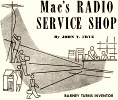 It has been a long time since I heard this
saying: "Well, they always say that if you want to find out the best and easiest
way of doing something, just put a lazy man at the job." Mac McGregor offered that
line to his service shop technician Barney - in jest of course - when Barney explains
his million dollar invention idea for a
fool-proof vacuum tube tester that can be used by just about anyone. Mac's Radio
Service Shop creator John Frye often used the monthly techno-drama to introduce
some good ideas for new inventions and/or new methods for troubleshooting problems.
Somewhere along the line I think I have seen an advertisement for a tube tester
that used the automation concept dreamed up by Barney... It has been a long time since I heard this
saying: "Well, they always say that if you want to find out the best and easiest
way of doing something, just put a lazy man at the job." Mac McGregor offered that
line to his service shop technician Barney - in jest of course - when Barney explains
his million dollar invention idea for a
fool-proof vacuum tube tester that can be used by just about anyone. Mac's Radio
Service Shop creator John Frye often used the monthly techno-drama to introduce
some good ideas for new inventions and/or new methods for troubleshooting problems.
Somewhere along the line I think I have seen an advertisement for a tube tester
that used the automation concept dreamed up by Barney...
 Always a good way to end a busy week, here
is a collection of
electronics-themed comics that appeared in a 1967 issue of
Popular Electronics magazine. A few of the artists you will recognize if you
are a regular reader. Some drawing styles are immediately identifiable, such as
those by Dave Harbaugh (of "Hobnobbing with Harbaugh" fame). Others, at least to
me, are not quite so familiar. Frank Tabor, George White, Stan Fine, and JAS (I'm
sure I know those initials, but can't place them) are amongst the others. I have
to admit to not really knowing what the gag is in the comic with the guy in his
pajamas. The party guy is cutting a wire to his ear buds... Always a good way to end a busy week, here
is a collection of
electronics-themed comics that appeared in a 1967 issue of
Popular Electronics magazine. A few of the artists you will recognize if you
are a regular reader. Some drawing styles are immediately identifiable, such as
those by Dave Harbaugh (of "Hobnobbing with Harbaugh" fame). Others, at least to
me, are not quite so familiar. Frank Tabor, George White, Stan Fine, and JAS (I'm
sure I know those initials, but can't place them) are amongst the others. I have
to admit to not really knowing what the gag is in the comic with the guy in his
pajamas. The party guy is cutting a wire to his ear buds...
 There is a physical limit to how small of
a distance may separate two distinct objects (line, dots, etc.), generally agreed
to be about half a wavelength of the color being observed, and be seen with perfect
human eye. Applying that rule of thumb to blue light with a wavelength of approximately
4000 Å (400 nm) yields a distance of 200 nm. Accordingly, there is
no amount of magnification possible which will allow a healthy human eye to resolve
objects closer together than that. Even with perfect optics, magnifications of greater
than about 1500x are not able to render greater detail. To resolve smaller distance
requires shorter wavelengths, but we cannot see them directly and need a device
to transform the detected image into a visible image. That is what an
electron microscope does to enable molecule sized particle to be "seen." The
SARS-CoV-2 particle has been measured by electron microscopy and found to range
between 50 to 140 nm, so it cannot be viewed directly with an optical microscope.
Cigarette smoke is about 400 nm in diameter... There is a physical limit to how small of
a distance may separate two distinct objects (line, dots, etc.), generally agreed
to be about half a wavelength of the color being observed, and be seen with perfect
human eye. Applying that rule of thumb to blue light with a wavelength of approximately
4000 Å (400 nm) yields a distance of 200 nm. Accordingly, there is
no amount of magnification possible which will allow a healthy human eye to resolve
objects closer together than that. Even with perfect optics, magnifications of greater
than about 1500x are not able to render greater detail. To resolve smaller distance
requires shorter wavelengths, but we cannot see them directly and need a device
to transform the detected image into a visible image. That is what an
electron microscope does to enable molecule sized particle to be "seen." The
SARS-CoV-2 particle has been measured by electron microscopy and found to range
between 50 to 140 nm, so it cannot be viewed directly with an optical microscope.
Cigarette smoke is about 400 nm in diameter...
 Comics are a great source of levity to take
you away from the day's normal flow of events. My favorite comic strips contain
themes that relate to familiar scenarios or that catch me by surprise with their
message.
Technically themed strips like this collection from Radio-Electronics
magazine are particularly welcome, but I do not appreciate gratuitous meanness and
never care to see death, dismemberment, or gore. Call me a prude, but I'm shocked
sometime by what appears in the daily newspaper comic strips (yes, I still read
the comics - and work the puzzles - every day). There are plenty more comics where
these came from, so stay tuned if you like them, too. Come to think of it, maybe
the "Fast" in "Fast TV Service" on page 102 in the November 1958 comic is a double
entendre... Comics are a great source of levity to take
you away from the day's normal flow of events. My favorite comic strips contain
themes that relate to familiar scenarios or that catch me by surprise with their
message.
Technically themed strips like this collection from Radio-Electronics
magazine are particularly welcome, but I do not appreciate gratuitous meanness and
never care to see death, dismemberment, or gore. Call me a prude, but I'm shocked
sometime by what appears in the daily newspaper comic strips (yes, I still read
the comics - and work the puzzles - every day). There are plenty more comics where
these came from, so stay tuned if you like them, too. Come to think of it, maybe
the "Fast" in "Fast TV Service" on page 102 in the November 1958 comic is a double
entendre...
 There is a twofer on this page - a feature
article and a couple related
electronics-themed comics. Point-to-point wiring of electronics
assemblies is rarely seen these days. For that matter, the use of leaded components
is rarely seen these days. The advent of printed circuit boards was a real breakthrough
concept when they became commercially viable in the 1950s. As the comic at the bottom
of the page suggests, many people did not even know what a printed circuit board
was. The air traffic control radar unit that I worked on in the USAF had all point-to-point
wiring in a trailer-full of chassis. Terminal strips and bus strips, bifurcated
terminals, tube socket terminals, and studs from relays and switches were the connection
points... There is a twofer on this page - a feature
article and a couple related
electronics-themed comics. Point-to-point wiring of electronics
assemblies is rarely seen these days. For that matter, the use of leaded components
is rarely seen these days. The advent of printed circuit boards was a real breakthrough
concept when they became commercially viable in the 1950s. As the comic at the bottom
of the page suggests, many people did not even know what a printed circuit board
was. The air traffic control radar unit that I worked on in the USAF had all point-to-point
wiring in a trailer-full of chassis. Terminal strips and bus strips, bifurcated
terminals, tube socket terminals, and studs from relays and switches were the connection
points...
 Computer analysis in 1976 was a job performed
on a corporate, university, or government mainframe. Radio Shack's TRS-80 came out
in 1977, but it did not have the capacity to calculate and plot antenna gain charts
like the one in this QST article. Yes, an ambitious programmer could write
the code necessary to perform the double integrals presented in the article, but
to do all the figuring needed to create all the graphs in Figure 4, the job would
just about be finishing up today - and that's not too much of an exaggeration. For
some reason the authors never mention what computer was used or where it was based.
When I saw the title of "Loops vs. Dipole,"
I expected the loop to be round or square, but for analysis purposes it was modeled
as a pair of parallel elements representing the horizontal components of a square
loop antenna. Justification for omission of the vertical sides... Computer analysis in 1976 was a job performed
on a corporate, university, or government mainframe. Radio Shack's TRS-80 came out
in 1977, but it did not have the capacity to calculate and plot antenna gain charts
like the one in this QST article. Yes, an ambitious programmer could write
the code necessary to perform the double integrals presented in the article, but
to do all the figuring needed to create all the graphs in Figure 4, the job would
just about be finishing up today - and that's not too much of an exaggeration. For
some reason the authors never mention what computer was used or where it was based.
When I saw the title of "Loops vs. Dipole,"
I expected the loop to be round or square, but for analysis purposes it was modeled
as a pair of parallel elements representing the horizontal components of a square
loop antenna. Justification for omission of the vertical sides...
 If you are familiar with
Carl Kohler's illustrations from his numerous humorous (a rhyme!)
electronics-themed stories in Popular Electronics magazine, then this comic
from the May 1955 issue will be recognized as having come from his hand. The 1950s
through maybe the early 1980s was a big time for do-it-yourself hobbyists of all
sorts, including those who dabbled in electronics as Hams, household handymen, kit
builders, etc. In many cases high quality products could be purchased more cheaply
as kits, as evidenced by the popularity of Heathkit and similar companies. By the
mid to late 1990s, super-cheap labor - verging on slavery - in the Far East was
doing the majority of component production and product assembly, so eventually an
inversion... If you are familiar with
Carl Kohler's illustrations from his numerous humorous (a rhyme!)
electronics-themed stories in Popular Electronics magazine, then this comic
from the May 1955 issue will be recognized as having come from his hand. The 1950s
through maybe the early 1980s was a big time for do-it-yourself hobbyists of all
sorts, including those who dabbled in electronics as Hams, household handymen, kit
builders, etc. In many cases high quality products could be purchased more cheaply
as kits, as evidenced by the popularity of Heathkit and similar companies. By the
mid to late 1990s, super-cheap labor - verging on slavery - in the Far East was
doing the majority of component production and product assembly, so eventually an
inversion... |







 Disneyland
Disneyland

























 Erie Technological Products
Erie Technological Products
















